James R. Callan's Blog, page 19
September 4, 2015
All for the want of a nail
 Many years ago, we bought a new computer. It was bigger than a large side-by-side refrigerator and cost as much as a small house. The hard disk, a separate cabinet the size of a washing machine, weighed in at just under one thousand pounds. Not to worry, it had a large capacity – eighty megabytes (considerably less than a dumb phone has today).
Many years ago, we bought a new computer. It was bigger than a large side-by-side refrigerator and cost as much as a small house. The hard disk, a separate cabinet the size of a washing machine, weighed in at just under one thousand pounds. Not to worry, it had a large capacity – eighty megabytes (considerably less than a dumb phone has today).
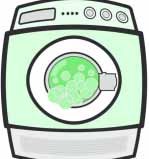 We already had a good printer (dot matrix, black and white) and the computer manufacturer was to make a special interface so that the computer and printer could communicate.
We already had a good printer (dot matrix, black and white) and the computer manufacturer was to make a special interface so that the computer and printer could communicate.
But when it was all set up, the printer would not work on the new computer. We called the salesman who had sold us the computer and reminded him we had purchased, from him, a special interface board so that we could use our existing printer. The next day, he called back and said the problem must be in the printer and we should contact the printer manufacturer.
I knew the problem wasn’t with the printer.
Next, he decided we needed a new cable connecting the computer to the printer. Cables back then were more complicated than they are today, and cost about $100, perhaps $300 in today’s dollars. After giving it some thought, I dismissed that and called him back. I was not going to make the final payment until the company had the printer working properly.
Finally, they sent out the man who had designed the interface. After studying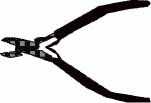 the situation for about five minutes, he pulled a pair of wire cutters from his pocket, clipped out a small resistor (cost: fifty cents) from the interface board and dropped it in the trash.
the situation for about five minutes, he pulled a pair of wire cutters from his pocket, clipped out a small resistor (cost: fifty cents) from the interface board and dropped it in the trash.
The printer worked perfectly.
This longwinded story illustrates two important facts. First, if you’ve got a problem, call an expert. You can get all sorts of free advice and it is usually worth about what you paid for it – nothing. He’s called an expert because he has special knowledge or skill in an area. If that’s the area where you’re having problems, that expert is the person to call. Even though a person is smart, he may have little or no knowledge of your problem. An expert eye doctor is of little help if you have colon cancer. The salesman was a terrific salesman. He didn’t know jack about special interfaces.
Second, even the smallest component in a complex system can bring the entire project to a grinding halt. So you must pay attention to the small things. Ignore them and the major components may not be able to do their job. It’s like the old proverb: for  the want of a nail, the shoe was lost; for the want of a shoe, the horse was lost; for the want of a horse, the rider was lost; for the want of the rider, the message was lost; for the want of the message, the battle was lost. All, for the want of a nail.
the want of a nail, the shoe was lost; for the want of a shoe, the horse was lost; for the want of a horse, the rider was lost; for the want of the rider, the message was lost; for the want of the message, the battle was lost. All, for the want of a nail.
If you have a problem, get help from an expert on that problem. And pay attention to the small details.
August 28, 2015
Are You Curious?
 People often believe that most others are like they are. They like beef so everybody must like beef. Oh, except for those strange people who are vegetarians. I like to travel, so surely everybody likes to travel. Everybody likes a good spy movie, right? And surely everybody is curious. I am. Isn’t that just part of being?
People often believe that most others are like they are. They like beef so everybody must like beef. Oh, except for those strange people who are vegetarians. I like to travel, so surely everybody likes to travel. Everybody likes a good spy movie, right? And surely everybody is curious. I am. Isn’t that just part of being?
We’re all different.
But, are you really curious? Do you question the serviceman when he says, “Oh, you don’t really need that extra wire.” Why not? Why did the last service company feel it was necessary and now you say it isn’t?
Someone says, “Don’t take the subway?” Why not?
You see a strange building. Do you ask what it is? Who uses it? What companies use it?
“We’ve always done it that way.” Do you ask why? Have you tried another method? Is there a reason it must be done that way?
Or, I wonder why the writer chose to handle that section is such a curious way?
Do you ask for explanations when someone gives you an answer – particularly when it doesn’t sound right to you?
If you see a bird you do not recognize, do you ask someone what kind of bird it is? Or perhaps you look it up in a book on birds, or the Internet.
Why is curiosity important?
Once we leave the education system, curiosity is the principal way we learn. If we are not curious, if we do not question things, we miss out on the opportunity to learn many things. If someone wasn’t curious about how what could be done with electricity we wouldn’t have all the convenient electrical gadgets that make our life easier today than it was before man was able to understand and harness electricity. And it was curiosity that drove him to learn what could be done with electricity.
learn. If we are not curious, if we do not question things, we miss out on the opportunity to learn many things. If someone wasn’t curious about how what could be done with electricity we wouldn’t have all the convenient electrical gadgets that make our life easier today than it was before man was able to understand and harness electricity. And it was curiosity that drove him to learn what could be done with electricity.
 Suppose Newton hadn’t been curious as to why the apple fell to the ground? What a leap forward when man became curious about fire, what could cause it to start, what could keep it burning. And Christopher Columbus was a bit curious about what he would find if he sailed west from Spain.
Suppose Newton hadn’t been curious as to why the apple fell to the ground? What a leap forward when man became curious about fire, what could cause it to start, what could keep it burning. And Christopher Columbus was a bit curious about what he would find if he sailed west from Spain.
For writers, the great question is, “What if?” That’s how many stories and books come about. If a writer was not curious, few books would be written.
Everybody should cultivate that important trait. The more curious you are, the more you will learn. Don’t let other get away with saying, “That’s just the way it is,” or “we’ve always done it that way.” Ask questions. Insist on answers. Don’t accept a situation or an answer without questioning it. Curiosity is an important quality to cultivate.
cultivate.
Try to be the most curious person around. Ask about everything.
Where did I get the idea for this book? Why did I make the protagonist a woman? Why did I allow this great character to get killed? Why did I choose a minister to get involved?
And just why did I write this post?
August 21, 2015
What Writers Need to Know About Fulfillment by Amazon (FBA
Today, author Stephen Woodfin tells us about a very successful,  but little known, Amazon program which is well suited to writers. Woodfin is a talented writer who makes it his business to study Amazon, learn as much as he can about the giant, and utilize those parts that make sense for him. He’s also an attorney, so he knows how to evaluate facts. Here is a gem for us – an Amazon program many of us could profit from. You’re on stage, Stephen.
but little known, Amazon program which is well suited to writers. Woodfin is a talented writer who makes it his business to study Amazon, learn as much as he can about the giant, and utilize those parts that make sense for him. He’s also an attorney, so he knows how to evaluate facts. Here is a gem for us – an Amazon program many of us could profit from. You’re on stage, Stephen.
Most writers are small business owners who focus on one line of products, the books they have written. However, they would be well served to broaden their horizons and think about selling other authors’ books.
What I’m talking about is a service Amazon offers called Fulfillment by Amazon (FBA).
There are two ways a person can sell books on Amazon. The first is the traditional method known as Merchant Fulfilled (MF). In MF, a person lists books for sale on Amazon, and when a customer purchases a book the seller receives a notice of the sale and ships the books to the buyer. This process is laborious, time-consuming and requires the seller to warehouse the books herself.
FBA is a horse of a different color. Under FBA the seller acquires the inventory, i.e., the books, and ships them to Amazon. Amazon stores the books in its own warehouses and ships the books to customers when they purchase them. Books sold through FBA receive the Amazon Prime perks of free two-day shipping and the protections that come from purchasing directly from Amazon. In other words, the customer base for FBA books is primarily customers who have Amazon Prime accounts.
There are about twenty million Amazon Prime members, and many of them are avid book buyers.
This is a match made in heaven for sellers and buyers.
Combine this with the fact that many authors have a storehouse of books in their homes which they have acquired over a lifetime of book hoarding and one can see the opportunity FBA presents for authors. They already have an inventory of free books, many of which are good candidates for sale through FBA.
What books fit the FBA model best?
It is really quite simple: Used books, primarily non-fiction, with a good sales ranking on Amazon. For purposes of our discussion, a good sales ranking is from 1 to 1,000,000, although that is not a hard and fast rule. Books ranked 1,000,000 plus sell every day on Amazon. They just don’t sell as quickly as better-ranked books.
Here is a thumbnail sketch of the process to sell successfully on FBA.
Create an Amazon Professional Seller account. This costs $39.99 per month.
Learn how to scan books. What one scans is the barcode on the back of the book. The seller must acquire a barcode scanner and the software necessary to interpret barcodes. To begin with, the seller can use her smart phone to scan the barcodes. Apps are available for less than $10 per month, which provide sales data for the books when they are scanned.
List the books on Amazon.
Ship the books to Amazon using Amazon’s very favorable shipping rates.
Wait for Amazon to sell the books.
Get paid. Amazon pays every other Monday like clockwork.
Is there any money in selling used books on FBA?
A lot of money. A conservative estimate is that a seller can expect an average sales amount of $10 per book. After fees, the seller nets about $6 per sale.
That’s an amazing number. The seller makes $6 per sale on books that she has sitting in boxes in her garage, or for which she has paid $.25 to $1.00 at a Friend of the Library sale, a thrift shop or an estate sale.
I have only touched the tip of the FBA iceberg in this post. But anyone interested in learning more about the details can Google “FBA” and read blogs and watch YouTube videos about it.
So if an author is interested in supplementing her income by selling other authors’ books, she should check out FBA.
I mean, a little extra cash always comes in handy.
Especially for writers.
JIM: Stephen Woodfin is an attorney, author, blogger, and FBA seller. Please take a minute to check out his Amazon author page. I have read a number of his books, and do not hesitate to recommend them.
August 14, 2015
Mixed Up Words
I know this is not an exciting blog, but nonetheless, I think it should be said.  Actually, it should be repeated. This is not something new, but it is something in need of reinforcement.
Actually, it should be repeated. This is not something new, but it is something in need of reinforcement.
Twice today, on national television no less, I heard one of my pet peeves. That is the misuse of badly. Badly is an adverb. Bad is an adjective. So, if you are modifying a noun or a pronoun, please use bad and not badly. Here are some examples. “He was feeling badly today.” This implies that his tactile sense was not working well. If we mean that he was a little under the weather, or not quite up to his usual state of health, then we need to say, “He was feeling bad today.”
Watch for sentences in which you really want the adjective “bad” to modify a noun or pronoun. Carefully avoid using the adverb “badly” which needs to modify a verb. “The pilot was in a bad mood, so he was handling the boat badly.” “Bad” modifies a noun, his “mood,” so we need an adjective. “Badly” modifies a verb, “was handling,” so we need an adverb.
Effect and affect are words where mistaken identity crops up frequently. (I’m putting these in because I often have trouble with those.) Effect means to bring about something. “You can effect good grammar by study.” Or, “Grammatical mistakes have a bad effect on the buyer.” Affect means to influence, or pretend. “Grammatical mistakes affect the buyer.” (It’s easy to see why these two give some of us a lot of trouble.) “You can affect your students.” Or, “He affected surprise, but I knew he had expected it.”
Of course, we all know the difference between “your” and “you’re.” Still, it is amazing how many times you see those words used incorrectly in a book. Carelessness?
Similarly, “their” and “they’re” and even “there” are often misused. No need to explain those here. Again, mistakes involving these words are usually just a result of haste or carelessness.
Easier to understand, but just as incorrect, it the misuse of “its” and “it’s.” Just remember that “it’s” is an abbreviation for “it is.” Remember, the ‘ takes the place of the “i” in the “is.” Try reading “it’s” as “it is.” If that doesn’t make sense, it’s the wrong word. (“Its cover was torn,” doesn’t make sense if you were to read it as, “It is cover was torn.)
 “Lose” and “loose” often get mixed up. Lose is the opposite of
“Lose” and “loose” often get mixed up. Lose is the opposite of win. Loose is the opposite of tight.
win. Loose is the opposite of tight.
“Alot” is not a legitimate word. “A lot” is correct.
And lastly, “farther” and “further.” Both can be adjectives or adverbs. But “farther” means at a greater distance. His house is farther from the fire station than my house.  He ran farther than I did. “Further” means to a greater extent. Further study is required. I will investigate the matter further. His demeanor made us believe there would be further repercussions.
He ran farther than I did. “Further” means to a greater extent. Further study is required. I will investigate the matter further. His demeanor made us believe there would be further repercussions.
This distinction is easy to remember. FARther refers to distance.
I apologize for my ramblings on such matters. These words pop up often in our writing, and we should be careful they are not used incorrectly. “But their misuse of the word “badly” always effects me badly (or has a bad effect on me) and it’s obvious the book needs its editors to do further work or they’re going to lose a lot of readers farther down the road.”
I know I’ve made some mistakes in this post. Let me know about them. And I won’t say bad things about you, even though I write badly. (Okay, I know that was bad, or written badly.)
August 7, 2015
Two Pet Peeves on Blogs
Today, I visited three blogs. Afterwards, I found that two of them left me a tad disappointed. It wasn’t the material. It wasn’t the writing. So, today, I’ll address the two things that will help make visiting your blog a better experience.
First, a reader wants the blog to load quickly. In fact, if it takes too long to load, she’s going somewhere else. What is too long? Depends on the person, the day, and what’s competing for attention. Some people are just naturally in a hurry. And they do not want to wait. Like the driver who’s easing into the crosswalk before the light turns green. Yes, he may be on the way to the hospital where his first child is about to be born. Yeah. But that’ just one out of a thousand who can’t wait for the light to change. Sitting still is wasting time.
and what’s competing for attention. Some people are just naturally in a hurry. And they do not want to wait. Like the driver who’s easing into the crosswalk before the light turns green. Yes, he may be on the way to the hospital where his first child is about to be born. Yeah. But that’ just one out of a thousand who can’t wait for the light to change. Sitting still is wasting time.
Then it might be this is a day with thirty-six hours worth of stuff to get done. OR the boss is standing with his hand out, waiting for something he considers important (but you know really isn’t) and you need to get some info off this website. Load slowly and you’ve made an enemy.
And of course, I really need to get on to a much better site (translate, more fun) and this turtle site is keeping you from getting to the good stuff.
So, how can we make the site load faster? The simplest way is to make sure pictures are not too large. By that I don’t mean putting in postage size images. I mean the images don’t have a boatload of bytes. If you are going to blow up a digital photo into a wall sized picture, you need lots and lots of bytes. A twenty megabyte picture might do the job. But you’re going to be posting a picture that could be three inches tall and four inches wide. Twenty megabytes or even one megabyte is a waste.
Load time is dependent on several issues. But a simplistic approach would say that a megabyte file will take roughly twice as long to load as a half-megabyte image. If you are printing this on a high-resolution printer and you need/want great detail, then by all means take the megabyte image.
But, for a computer screen, you won’t see any difference in the displayed image between the megabyte file and the half-megabyte file. And if it isn’t a particularly large image on the screen, you could get the same display quality from a fifty kilobyte file. Often, twenty-five kilobytes is more than enough. And the load time for the megabyte file is noticeably longer than the twenty-five KB file. Also, when you load a large file for a small picture, the website is going to resize it – another waste of time.
Can you tell which of these images was nearly a megabyte file and which was a two hundred kilobytes file?
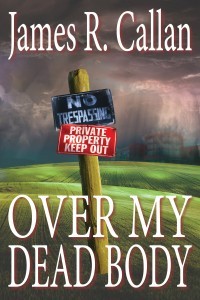
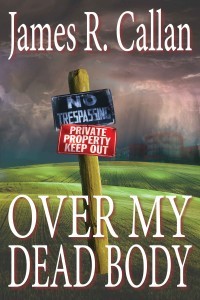
If you have a lot of images already on your site which you didn’t optimize, do you have to go back and fix all of them? Fortunately, you do not. There are some plugins that will reduce the size of picture files for you.
If you encourage comments you have another way to make the site friendlier. Get rid of  the captchas. Now, you will ask about spammers. There are plugins to help eliminate or reduce spammers. Find one that has good reviews and install it. See if that solves the issue or reduces it sufficiently that it’s not a problem anymore. Now, the commenter can just – comment. That will make her happy.
the captchas. Now, you will ask about spammers. There are plugins to help eliminate or reduce spammers. Find one that has good reviews and install it. See if that solves the issue or reduces it sufficiently that it’s not a problem anymore. Now, the commenter can just – comment. That will make her happy.
I visit some sites on which I really want to leave a comment. But a captcha or some other obstruction makes it difficult, and time-consuming. After a few minutes, I give up. No comment. The post elicited a comment, but I couldn’t find an easy way to leave one.
Those are just two things that will make your blog more attractive to readers. Of course, the two main ingredients of a great blog are: interesting, helpful material and well written material. If you write material that reads like a mathematic book, faster loads and easy commenting won’t help. First, you need to have a blog that is well written and gives the reader useful or interesting information. Once you’ve got this really good blog, don’t make it a chore to get the blog to load. And make it easier for the reader to leave a comment.
No captcha here. Leave a comment. Thanks.
July 31, 2015
Humor and Serious Elements in the Cozy Mystery
Lesley Diehl retired from her life as a professor of psychology and reclaimed her country roots by moving to a small cottage in the Butternut River Valley in upstate New York. In the winter she migrates to old Florida. She is the author of a number of mystery series and mysteries as well as short stories. Having read her books, I can tell you she knows what she is talking about here. Here’s Lesley.
reclaimed her country roots by moving to a small cottage in the Butternut River Valley in upstate New York. In the winter she migrates to old Florida. She is the author of a number of mystery series and mysteries as well as short stories. Having read her books, I can tell you she knows what she is talking about here. Here’s Lesley.
I love to write funny mysteries. I think everyone can use a laugh now and then, even in a mystery where there’s a dead body. No, there is nothing funny about murder, but the events surrounding it, the characters in the story, the setting and character interactions can be humorous, and that’s what I strive for in my work. Nothing feels as freeing as a good chuckle. It’s both emotionally and physically liberating.
Humorous mysteries or cozy mysteries with humor in them are often labeled “light reads”, but does that mean they can’t contain material that is serious? The protagonist is usually a female who possesses a keen mind and a nose for discovery. Her skills as an amateur sleuth are not to be taken lightly, however. She gets the job done, often on her own, but sometimes with a gal pal or sidekick associated with law enforcement who helps provide support and clues, but the crime solving is really hers alone. That pretty much describes Eve Apple, my protagonist in the Eve Appel mysteries, except Eve probably has more sass than most amateur sleuths. She gets herself into some crazy situations, but true to form, she gets herself out again, sometimes with the help of her unusual friends and family.
Eve and her adventures are good for a laugh, but I think cozy mysteries can entertain serious issues also. I like to take these issues and make them part of the subplots surrounding the murder. The Eve Appel mysteries are set in rural Florida, a place not yet spoiled by overdevelopment, but it is not immune to the greed of land developers. Swampland is seen as ugly, and the animals inhabiting it as expendable. The real world intrudes upon Eve and her friends in the form of greed, animal abuse, human trafficking, drugs, water pollution and racism. These are the issues which become the subplots I weave into Eve’s search for the bad guys.
There are some hilarious moments surrounding Eve’s love life also, but Eve has real commitment issues, making her romance with Alex, her current love interest, a rocky road and her divorce from Jerry painful. Meeting Sammy Egret, the Miccosukee Indian, complicates Eve’s life further because Sammy makes her toes curl. These romantic elements are put together in yet another subplot, this one with serious aspects to it, but punctuated with humor also.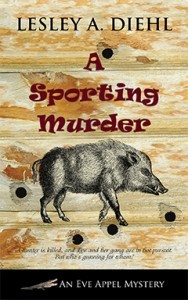 Humorous elements juxtaposed with somber notes can make for a provocative read as revealed in my latest Eve Appel mystery, A Sporting Murder. Some men have thrown chum into the water where Eve and her friends are swimming attracting sharks. In true Eve like fashion she takes action in a humorous way:
Humorous elements juxtaposed with somber notes can make for a provocative read as revealed in my latest Eve Appel mystery, A Sporting Murder. Some men have thrown chum into the water where Eve and her friends are swimming attracting sharks. In true Eve like fashion she takes action in a humorous way:
They hauled anchor and started their twin outboards.
I was so angry at their casual attitude that I wanted to bite them. A chunk of chum bobbed toward us. I grabbed it out of the water and threw it at their boat. It landed in the stern.
“Lucky toss, Eve,” said Alex.
I smiled. “You don’t know how lucky. The top was open to the box where their deck cushions were stowed. It landed in there with them.” I pointed to the gory mess as it slid down into the box between the cushions.
As the boat moved away from us and its captain opened the throttle, the surge forward made the cushion box slam closed.
In contrast, I included a scene which revealed the racist attitude of some of the populace toward members of the Miccosukee tribe. This serious scene takes place at the Grandfather Egret’s house the day after Sammy leaves the hospital:
Linc and the deputy left the bedroom. I heard the deputy say, “Damn Indians. First they want us to take the disappearance of one of them seriously, then they want us to dismiss it. He probably was drunk or high on something.”
I would have been out the door to tell him what I thought of his prejudice, but Alex restrained me. Sammy gave me one of his shy grins. Through the open door I saw Grandfather get up from his porch rocker and step in front of the deputy.
“No one invited you here, but I am inviting you to leave and take your mean mouth with you. We’re grieving the loss of a good boy, and I think the family and the tribe are due a little respect.”
“Sorry, Mr. Egret,” said Linc. “I’m sure he didn’t mean what he said. He’s just overzealous and wants to wrap up this case. Two men have been killed, a hunting client and Bernard, then Sammy is taken and shot. We’re concerned.”
“No, you’re not, not really,” said Grandfather. “You’re worried leaving the murders unsolved will make you look bad, and the sheriff is coming up for reelection, isn’t he?”
“We’re out of here.” The deputy headed to his car, then turned and walked back to the porch. “You think about this. Next time you need us, we may not be there for you.”
In both cases the events tell the reader something about the characters involved, Eve’s in-your-face attitude and Grandfather’s Egret’s calm, yet defiant demeanor. Although the characters take charge in similar manners, one scene is humorous, the other serious.
Just as there is no way to fully separate humor from the grave moments in romance, the same is true for the other thoughtful subplots involving the impingement of the real world upon rural Florida. If done well, the cozy mystery written with humorous elements should parallel everyday life, perhaps with a larger laugh thrown in here and there, and with the certainty that we have caught the bad guy and he or she will pay.
JIM: Well done, Lesley. A Sporting Murder is the third book in Lesley’s Eve Appel mystery series. The first two, A Secondhand Murder and Dead in the Water, were well received and good reads.
Visit her on her website: www.lesleyadiehl.com.
And leave Lesley a comment if you have a minute. Thanks.
July 24, 2015
Writing with Pain
Patty Smith-Hall is a multi-published, award-winning author with Love Inspired Historical/Heartsong and currently serves as president of the ACFW-Atlanta chapter. Today, she offers suggestions on how to write when you are in pain. She will also give a copy of her latest book to someone, chosen at random, from those who leaves a comment.
with Love Inspired Historical/Heartsong and currently serves as president of the ACFW-Atlanta chapter. Today, she offers suggestions on how to write when you are in pain. She will also give a copy of her latest book to someone, chosen at random, from those who leaves a comment.
Writers are always told that one key to getting a publishing contract is to ‘put your backside in a chair and write!’ But what if you physically can’t sit for any length of time without being in a great deal of pain? What do you do then?
So how do writers who face chronic, debilitating pain write?
1) Standing desk and ergonomic rug
One of my favorite people (and best-selling novelist!) Camy Tang came up with a wonderful idea to deal with her chronic back issues. At her desk, she keeps a box that she places on her desktop when she feels the need to stand. It’s the perfect height for her computer and allows her to continue working while giving her a chance to stand and stretch. If you have an island in your kitchen, that’s also a great place to work without having to sit. If you want something a little more decorative, there are many standing desks available on Amazon, starting for as little as $50.
Another important item that works wonders is an ergonomic rug. These are designed to help relieve fatigue on the lower extremities and is well worth the price (which can range anywhere from $30 to well into the hundreds.) I’d suggest you try it out first–yes, you may look crazy, standing on a rug in the middle of Bed, Bath and Beyond but better to make sure it’s the right rug for you than waste money.
2) Alphasmart word processor
You’re sitting at your desk or in your favorite chair, ready to write and it’s just not comfortable. You fidget for a few minutes, hoping to find that perfect position but it just isn’t happening. Maybe the chair upstairs would work but that means dragging your computer up a flight of steps and you’re not even sure you can make it without falling down. That’s where an Alphasmart can help. Weighing under a pound, this portable word processor has eight individual files which can save multiple chapters and be downloaded into Word with just the press of a button. And you don’t have to worry about tripping over cables–four AA batteries is all you need to keep writing for months at a time.
3) Egg Timer
I don’t know about the rest of you, but when I get writing, time just slips away from me. I’ll look up and two hours would have gone by. Good for my book. Not at all good for my back. So now I keep an egg timer on my desk and set it for 35 minutes. When that bell goes off, I stand up and move. Take a bathroom break. Fold a dryer full of clothes. Anything to get moving. Then I go back to my desk and reset my timer. I may not write as much but I’m not in as much pain either.
4) Digital pen
The pain is so bad, you can’t even sit up. So now that you’re flat on your back, what do you do? Consider a digital pen. A bit thicker than a standard pen, it has the capability to transfer your writing into Word files while also serving as a recording. It’s not for everyone, and it’s expensive starting at $119 (plus the specialized notebooks.) So once again, try it before you buy it.
5) Pen and paper
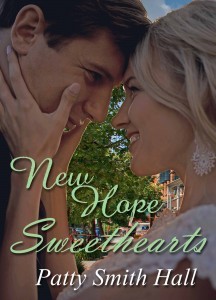
Old fashioned, yes, but when you’re flat on your back and desperate to write, it’s an easy alternative. Not much of an added expense – I can buy my favorite pens and writing tablet for under $5. With the back-to-school sales beginning, you can stock up on notebooks and pens for later. Yes, your writing will still need to be typed into the computer (consider purchasing Dragon Naturally Speaking—a wonderful tool for any writer!) but writing freestyle is very liberating. I’ve written the first draft of my last four books like this. It’s slower, but still gets the job done.
JIM: Well, she has taken away some excuses. And she has offered a lot of good ideas for those of us who find it difficult to sit at the computer for long periods. Please leave a comment – offer your suggestions for how to deal with pain. She’s giving away a copy of one of her books to someone who leaves a comment. Her latest book, New Hope Sweethearts, released this month. Check out all of her books on Amazon.
July 17, 2015
Don’t Annoy the Novelist
Today, our guest is Janet Sketchley, a Canadian writer of suspense and redemption. She has also  had published over one hundred articles. She likes Formula 1 Racing, adventure stories and tea. She has also generously agreed to give a free copy of her latest book to one commenter, chosen at random. But for now, let’s hear why you should never annoy the novelist. Here’s Janet.
had published over one hundred articles. She likes Formula 1 Racing, adventure stories and tea. She has also generously agreed to give a free copy of her latest book to one commenter, chosen at random. But for now, let’s hear why you should never annoy the novelist. Here’s Janet.
Almost twenty years ago, I was an at-home mom with young children. We did errands together, bought groceries. Took the car for repairs. Since at least one of the boys still used a child safety seat in the car, this meant waiting while the work was done.
I’d had bad experiences with the local dealership, but when they contacted me about a recall, I ventured in.
We must have been in the waiting room for an hour, reading stories and snacking on cookies, when the guy at the desk called my name. “I’m sorry, your vehicle’s not under warranty anymore. The mileage is too high.”
I looked at him. “Your service department called me. They couldn’t do something like check the odometer when I first arrived?”
His smile didn’t do anything to defuse my frustration. “Sorry.”
Most days I can wait with the best of them, but I don’t do well when I discover I’ve waited in the wrong line, or in this case, waited for nothing. I’d been on edge emotionally that week, and a sudden sense of injustice turned this quiet Canadian into a customer-service nightmare.
I may have yelled. May even have cried, I’m not sure. I’m rarely tempted to swear, but right then it took a conscious effort to use only clean words.
Management tried to shoo me into a quiet room, out of the main waiting area, but I wouldn’t budge. I’d seen them do that with a businessman when I arrived. How many unhappy customers did these people have today?
As soon as I had my keys in hand, I gathered my children and left. Fuming.
This particular dealership wasn’t far from home. Many times the traffic lights would stop me directly in front of it. Every time I saw the building, resentment bubbled and I chose to let it go. It didn’t go far.
I was writing a novel about forgiveness, and here I had this experience I couldn’t put behind me. It wasn’t even an intentional hurt, just a poorly-run business where customers fell through the cracks.
My second novel gave me a chance at catharsis. One of the characters, Joey, had some things in his past that he’d rather forget. Including an impaired driving charge that ruined his career and landed him in jail.
Coming home from a party, with his boss’ daughter in the passenger seat, Joey decided to plant his fancy sports car through the dealer’s showroom window – “returning it for poor service.”
Yes, the thought had crossed my mind. No, I’d never do it. And no, I’ve never driven a sports car. But Joey gave me the chance to entertain the thought vicariously. Not in the “I wish it would happen” way, but in an offbeat, darkish sort of amusement that I can’t explain.
Something shifted. I still made a conscious choice to forgive, whenever I stopped at the lights facing the building. But now I had a little grin on my face, and my private joke took the barb out of my old wound. Eventually, I could drive by with a smile and no hurt feelings at all.
For the fiction writers reading this post, I’m curious: what’s something from your own life that has crept into your stories? Have you done this sort of stress-release intentionally?
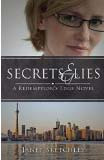 For the readers (including writers): if you’d like to see how Joey’s past comes back to cause trouble in his present, I’m giving away one copy of my Christian romantic suspense, Secrets and Lies. It’s really Carol’s story, the single mom threatened by a drug lord, but Joey would very much like to be her friend – and more.
For the readers (including writers): if you’d like to see how Joey’s past comes back to cause trouble in his present, I’m giving away one copy of my Christian romantic suspense, Secrets and Lies. It’s really Carol’s story, the single mom threatened by a drug lord, but Joey would very much like to be her friend – and more.
One commenter’s name will be chosen at random to receive a copy of the book. Offer void where prohibited.
JIM: Thanks, Janet. Good story. I saw a writer at the last conference who had on a Tee that said, “Be nice, or you’ll appear in my next novel.” I’ll bet many of us have included a caricature of someone in our novel. If you have a story to tell on that front, leave a comment. AND, you’ll be entered in the drawing for a free copy of Janet’s Secrets and Lies. Thanks.
July 10, 2015
Your Writing is Like a RaceHorse
I guess everybody knows American Pharoah won the Belmont race. That, coupled with his wins at the Kentucky Derby and the Preakness Stakes, earned him the Triple Crown, the ultimate honor in horseracing and the first horse to accomplish that in thirty-seen years.
I thought about all the preparation and work that went into accomplishing such a feat. And then I thought, “That’s much like writing a novel.”
For the racehorse, there’s lots of training over some years, something like the work and preparation necessary to develop the writing skills. A racehorse must be lean and strong, just like your writing – lean and strong. Neither the racehorse nor the book can have a lot of fat. Both need strong bones (structure). For either to win, it needs superior muscles (strong verbs).
When the race starts, the horse must be out of the gate fast to secure a good running lane. Your book needs to start fast, with a compelling hook on the first page. Without a good start, the horse will have a long race of catching up. Forget the enticing hook at the beginning of your book and the reader may put it down and never read it.
With horse races and books there is a danger of a weak middle. This makes it difficult for both animal and writer to ever regain the lead and finish a winner.
And both need a strong finish. How many races have been lost when the horse in second place gives a little extra and finishes just a nose ahead of the front runner. For the writer, the ending must be strong. It’s the last thing the reader sees, remembers. The ending can cause the reader to immediately look for another book by this author, to tell friends about this great book, to recommend it on social media. Or, the reader can put it away, not mention it to anybody and avoid picking up another novel by that author.
A true champion horse needs little encouragement. He takes the bit and charges out. He intends to be ahead of the others in the race. He will do his best to finish first. A great story can actually lead the author in the right direction. Characters will speak to the writer, demand to be heard, dictate how the plot unfolds. The wise jockey gives the horse his head. The smart writer pays attention to what the characters need and often follow their lead.
Not all great racehorses win the Triple Crown, and not all great books will sell a million copies. But the really good racehorses will win races and the really good novels will gain a following.
July 3, 2015
My Dad the Hippie, part 2
Ann Lee Miller earned a BA in creative writing from Ashland (Ohio)  University and writes full-time in Phoenix, Arizona, but left her heart in Florida, where she grew up on a sailboat. She loves speaking to young adults and guest lectures on writing at several Arizona colleges. Over 100,000 copies of her debut novel, Kicking Eternity, have been downloaded from Amazon. She blogs memoir at AnnLeeMiller.com. Here is the second half or her memoir article about growing up on a sailboat.
University and writes full-time in Phoenix, Arizona, but left her heart in Florida, where she grew up on a sailboat. She loves speaking to young adults and guest lectures on writing at several Arizona colleges. Over 100,000 copies of her debut novel, Kicking Eternity, have been downloaded from Amazon. She blogs memoir at AnnLeeMiller.com. Here is the second half or her memoir article about growing up on a sailboat.
Dad didn’t just admire flower child freedom. He quit his job managing Shenandoah Pool to build our forty-foot yawl in the back yard. Then, the no-job lifestyle stuck. Mom’s nursing and Dad’s playing the market—his huge graphs spread across the fore cabin while he plotted his stocks—paid marina rent, Catholic school tuition, and kept us in bathing suits and zinc oxide. I don’t think he gave a flip that his BS in business from the University of Miami moldered while he boat and child-minded, bagged a Euell Gibbons life.
We slid into the mouth of the waterway, and I dropped the mainsail.
Dad yanked on the lawnmower cord to our ten-horse, secondhand, Johnson outboard, swore, yanked, swore.
My fingers clenched around the bowsprit as we coasted into the narrow inlet.
Mom sat at the helm, my brother smashed up against her side.
Finally, the motor coughed to life, and Dad muscled it down the stern into the water.
Ten minutes later we puttered into a virgin cove, surrounded on four sides by land and pines.
Dad killed the motor, and we glided into the perfect center.
We dropped anchors fore and aft and stowed sail to our transistor radio blaring the weather.
Hurricane Laurie hooked southeast and headed for Mexico.
We cheered.
That night, in my bunk in the after cabin, I lie awake listening to the strange sounds of the cove.
Dad wasn’t a hippie. Our car was a ten-year-old Plymouth Valiant he’d painted tan—with a paint brush—over the original white. But a picture from half a life ago lapped against my ear from the other side of the hull. I’d been five, and my parents quit their jobs, packed us up, and drove out west to pan for gold—in a Volkswagen van.
I shouldn’t have been surprised several years later when Dad grew out his hair like Willie Nelson or that he never again worked a “real job.”
Dad protected me from skin cancer, unhealthy eating, and a sedentary lifestyle. He gave me books, boats and the ability to write for twelve years without a paycheck. I have Dad to thank that I rebelled into conservatism and God. Conservatism may be expendable, but God I’ll keep.
JIM: Here’s the blurb for her latest novel.
Growing up on a boat made it easy for me to set the stage for the Christian romance Tattered Innocence, a tale of passions indulged, denied, and ultimately forgiven.
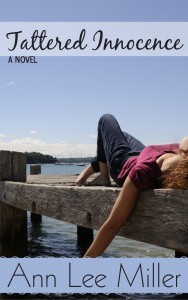 On the verge of bagging the two things he wants most—a sailing charter business and marrying old money—Jake Murray’s fiancée/sole crew member dumps him. Salvation comes in the form of dyslexic, basketball toting Rachel Martin, the only one to apply for the first mate position he slapped on craigslist.
On the verge of bagging the two things he wants most—a sailing charter business and marrying old money—Jake Murray’s fiancée/sole crew member dumps him. Salvation comes in the form of dyslexic, basketball toting Rachel Martin, the only one to apply for the first mate position he slapped on craigslist.
On a dead run from an affair with a married man, Rachel’s salvation is shoving ocean between her and temptation.
Rapid fire dialogue and romantic tension sail Jake’s biker-chick of a boat through hurricanes, real and figurative. A cast of wannabe sailors, Rachel’s ex, Jake’s, a baby—go along for the ride.
The many-layered story weaves together disparate strands into a seamless cord. Mother and daughter look eerily alike—down to their lusts. Their symbiotic bond, forged in the blood of childbirth on the kitchen floor and cemented by their secrets, must be cracked open. A son must go home. Sin must be expunged.
Tattered Innocence is for anyone who’s ever woken up sealed in a fifty-gallon drum of their guilt.
You can view her book Tattered Innocence on Amazon by clicking



